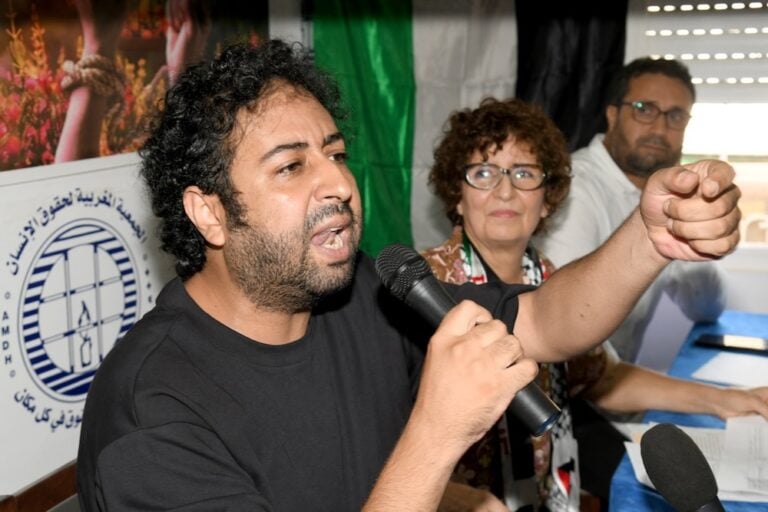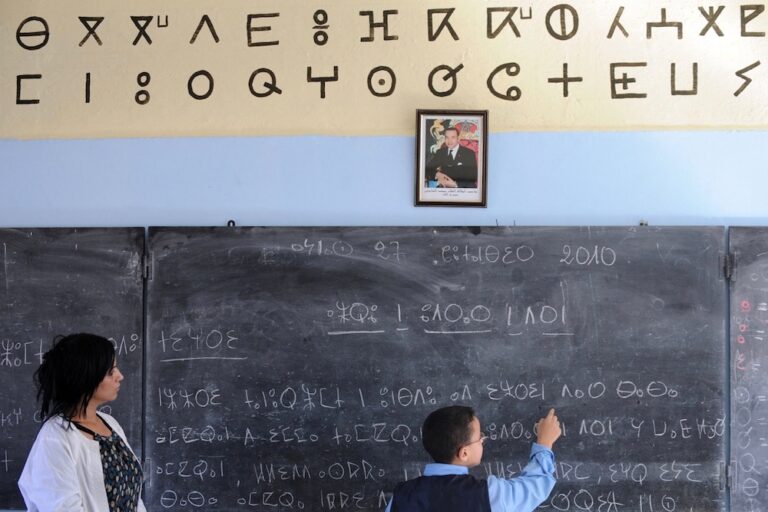In a 19 April 2000 letter to Prime Minister Abderrahamane Youssoufi, CPJ expressed its deep concern about the censorship of the French-language weekly newspaper “Le Journal” and its sister publication the Arabic weekly “Al-Sahiffa”, as well as the dismissal of three employees from television station 2M. On 15 April 2000, Moroccan airport police informed staff […]
In a 19 April 2000 letter to Prime Minister Abderrahamane Youssoufi, CPJ expressed its deep concern about the censorship of the French-language weekly newspaper “Le Journal” and its sister publication the Arabic weekly “Al-Sahiffa”, as well as the dismissal of three employees from television station 2M.
On 15 April 2000, Moroccan airport police informed staff at “Le Journal” and “Al-Sahiffa” – which are both printed in France – that the current editions of both papers were banned from distribution in Morocco. According to a Ministry of Communications statement issued later that day, the action was taken because of an article in that week’s issue of “Le Journal” about the continuing dispute over the Western Sahara. The article was written by “Le Journal” director Aboubakr Jamai, based on his recent interview with Muhammad Abdelaziz, leader of the Polisario Front rebel movement, which has been fighting for the territory’s independence.
The banned edition of “Le Journal” also contained several other articles about the Western Sahara issue. That day’s edition of “Al-Sahiffa” did not mention the Abdelaziz interview, but was banned nonetheless.
The ministry’s statement said that the two publications had been banned because of “excesses in [their] editorial line … concerning the question of Morocco’s territorial integrity,” along with their alleged “collusion with foreign interests.”
In the last two months, Moroccan authorities have censored at least two other publications. On 15 February, the government blocked distribution of the magazine “Jeune Afrique-L’Intelligent”, in apparent response to its recent publication of a letter from a Moroccan expatriate living in Canada that questioned King Muhammad VI’s commitment to reform in Morocco. On 4 March, Moroccan censors banned the French daily “Le Figaro” for one day, apparently in response to an article in that day’s issue citing a book that alleged the complicity of King Hassan II (father of the present king) in the 1965 disappearance of Moroccan opposition leader Mehdi Ben Barka (see IFEX alert of 21 March 2000).
CPJ is also deeply concerned about the dismissal on Monday 17 April of three employees of the state-controlled television station 2M. On that day, 2M’s board of directors, which is headed by Communications Minister Mohamed Larbi Messari, announced that it was dismissing director general Larbi Belarabi, program director Mustafa Melouk, and editor Muhammad Mamad, for making an unspecified “professional error” in a 14 April newscast. This “error” is widely believed to have been mentioning “Le Journal”‘s forthcoming interview with Mohamed Abdelaziz.
Recommended Action
Send appeals to the prime minister:
– stating that you view the censorship of “Le Journal” and “Al-Sahiffa” as flagrant violations of the internationally-guaranteed right to free expression
– noting that you believe that Belarabi, Melouk, and Mamad were unjustly dismissed for carrying out their professional duty as journalists, and should be reinstated
– reminding His Excellency that Article 19 of the Universal Declaration of Human Rights grants journalists the right to “seek, receive, and impart information and ideas through any media and regardless of frontiers”
– urging His Excellency to ensure that “Le Journal” and “Al-Sahiffa” are able to resume distribution in Morocco without further government interference, and that Moroccan authorities immediately cease the censorship of all news publications published or distributed in Morocco
Appeals To
APPEALS TO:
His Excellency Abderrahamane Youssoufi
Prime Minister of the Kingdom of Morocco
Rabat, Morocco
Fax: +212 7 769 995
Please copy appeals to the source if possible.


